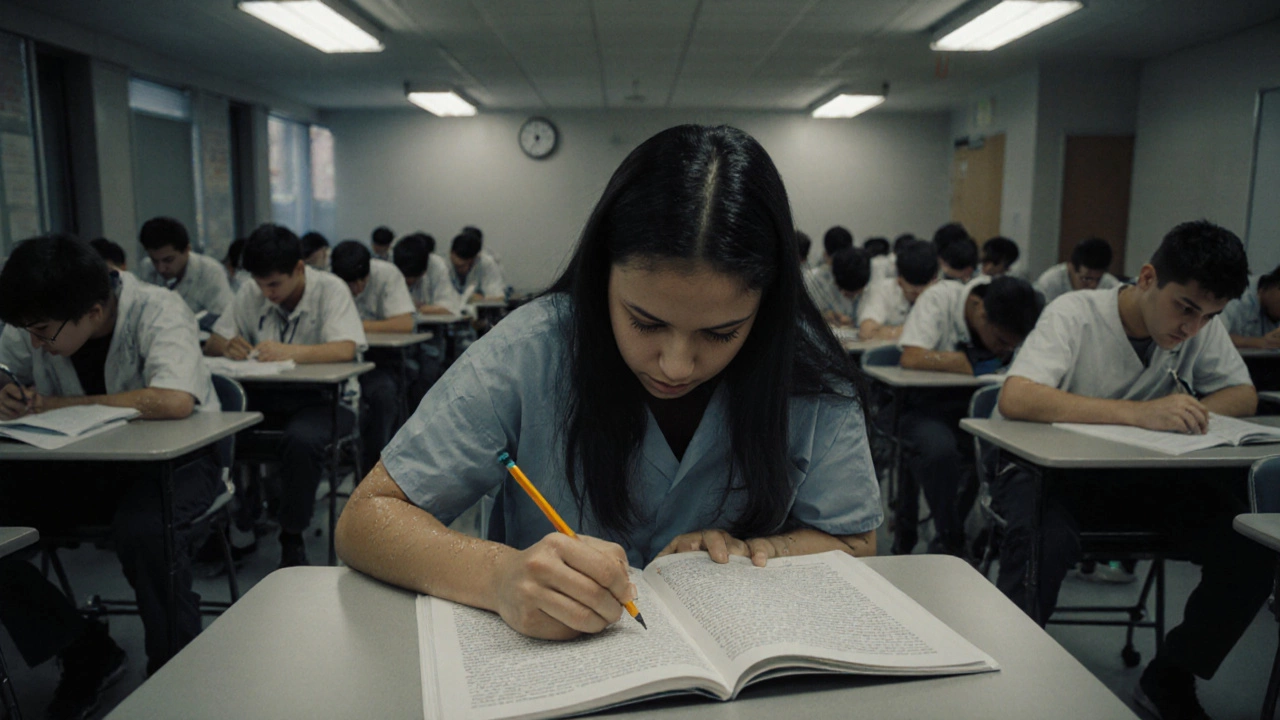Career Path Advisor
Answer these 4 questions to see which exam aligns better with your strengths and goals. Based on your answers, we'll show you which path is most suitable for you.
Your Result
Your score will appear here
People often ask if the CPA is harder than the MCAT. The answer isn’t simple-because these two exams aren’t even in the same universe. One is for future doctors. The other is for future accountants. But if you’re trying to decide which path to take-or which exam to prepare for-you need to know what you’re really signing up for.
What the CPA Exam Actually Tests
The CPA exam isn’t about memorizing tax codes. It’s about applying them. The exam has four sections: Auditing and Attestation (AUD), Business Environment and Concepts (BEC), Financial Accounting and Reporting (FAR), and Regulation (REG). Each section is four hours long. You need to pass all four within 18 months. Most people take 9 to 15 months to finish them all.
What makes CPA tough isn’t the depth of math-it’s the breadth. You’re expected to know how to audit financial statements, interpret U.S. GAAP, understand federal tax law, and explain internal controls. It’s not enough to know the rules. You have to know how to use them in messy, real-world situations.
Pass rates hover around 50% per section. That’s not because the questions are trick questions. It’s because the exam expects you to think like a practicing CPA. You’re not just answering questions-you’re making judgments. And those judgments have real consequences for clients.
What the MCAT Actually Tests
The MCAT is a marathon. It’s 7.5 hours long. No breaks for food or coffee. Just you, your thoughts, and 230 questions spread across four sections: Biological and Biochemical Foundations of Living Systems, Chemical and Physical Foundations of Biological Systems, Psychological, Social, and Biological Foundations of Behavior, and Critical Analysis and Reasoning Skills (CARS).
Unlike the CPA, the MCAT doesn’t test applied knowledge. It tests how well you can absorb and analyze massive amounts of new information under pressure. The science sections cover everything from organic chemistry to human physiology. The CARS section? That’s pure reading comprehension on dense, abstract texts-philosophy, ethics, sociology. No prior knowledge helps. You have to reason through it on the spot.
Passing the MCAT isn’t about getting 70% right. It’s about scoring in the top 10-15%. The average score for accepted medical students is around 511 out of 528. That’s not a curve. That’s a wall. Most people spend 300+ hours preparing. Some do 500. And even then, many don’t get in the first time.

Why Comparing Them Is Like Comparing a Marathon to a Triathlon
The CPA is a long, steady climb. You study for months. You take one section at a time. You can retake a section if you fail. You have flexibility. You can work full-time while studying. Many do.
The MCAT is a sprint with a mountain on your back. You have one shot to get a score that puts you in the running. There’s no partial credit. No second chances unless you’re willing to wait a year. Your score determines whether you get into medical school at all.
CPA candidates often say: “I didn’t know half the stuff on the exam until I started studying.” That’s true. But you can learn it. The material is structured. There are textbooks. Practice exams. Review courses. You can drill until it clicks.
MCAT candidates say: “I studied everything. I aced practice tests. Then I sat down and my brain froze.” That’s also true. The MCAT doesn’t reward memorization. It rewards cognitive stamina. You have to think clearly after seven hours of reading dense scientific passages and answering questions about quantum physics, neurotransmitters, and ethical dilemmas-all in the same day.
Who Finds Each Exam Harder?
If you’re a numbers person-detail-oriented, patient, good with systems-you’ll find the CPA challenging but manageable. You can break it down. You can study in chunks. You can review until you get it right.
If you’re a science person-curious, quick-thinking, good at connecting ideas across disciplines-you might find the MCAT more natural. But don’t be fooled. The volume of material is insane. And the CARS section? That’s where even top biology majors crash.
One CPA candidate I talked to in Adelaide spent 18 months studying while working 50-hour weeks. She passed all four sections on her third try. “It felt like climbing a hill with no top,” she said. “But I could see the next step. I knew what to do.”
A pre-med student from Melbourne studied for 10 months. He took the MCAT twice. His first score: 505. His second: 518. He got into med school. “The first time, I thought I knew everything. The second time, I realized I didn’t know anything.”

What the Numbers Don’t Tell You
CPA pass rates are published. MCAT scores are ranked. But neither tells you the real cost.
CPA candidates often quit because they get burned out. Not from the content. From the grind. It’s a years-long project. You have to stay disciplined. No one’s watching. No one’s checking on you. You’re just showing up every day.
MCAT candidates quit because they feel broken. They’ve poured their identity into this one test. When they don’t get the score, they don’t just lose a chance-they lose a future they’ve imagined since high school.
One isn’t harder than the other. They’re just hard in different ways.
Which One Should You Take?
Don’t ask which is harder. Ask which path you want to live.
If you want to work with numbers, help businesses stay compliant, and build a career that lets you work remotely or start your own firm-go for the CPA. You’ll have job security. You’ll have flexibility. You’ll have a clear path.
If you want to diagnose illness, save lives, and spend your days in hospitals or labs-go for the MCAT. You’ll have purpose. You’ll have pressure. You’ll have a career that demands everything.
There’s no trophy for picking the “harder” exam. Only the one that matches who you are-and who you want to become.
